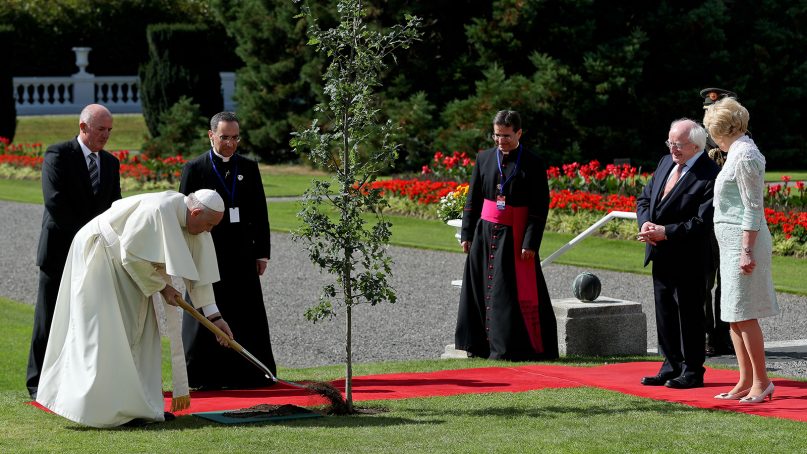DUBLIN (RNS) — Hours before the arrival of Pope Francis, the world’s leading champion of the environment, the Irish Catholic Bishops Conference announced it would divest from fossil fuels.
The move comes in response to Francis’ 2015 environmental encyclical, “Laudato Si,” (or “On Care for Our Common Home”), and follows the introduction of a bill in the Irish Parliament requiring the country’s sovereign wealth fund to divest from all fossil fuels.
The bishop’s move means withdrawing investments in 200 oil and gas companies within 5 years, Bishop William Crean, chairman of the Irish Catholic humanitarian agency Trócaire, said in a statement.
The Irish Bishops Conference joins 95 other Catholic organizations worldwide in committing to divestment. If the Irish bill passes, it will make Ireland the world’s first government to divest from fossil fuels.
“The impact in terms of human suffering to families is devastating,” the Irish bishops said in a statement Friday (Aug. 24). Climate change is already leading to forced migration, separation of families, and increased pressure on resources.”
On June 9, Pope Francis met with oil executives at the Vatican. “Civilization requires energy, but energy must not destroy civilization,” he said in his address.
Building a more sustainable approach to the economy, work and the environment is one of six major themes at the World Meeting of Families in Dublin this week.
At a panel on “Care for Our Common Home: Why the family matters to the future of our planet,” and at an interfaith service at Dublin’s Christchurch Cathedral, bishops from Myanmar and New Zealand addressed the topic of climate change.
Cardinal Charles Maung Bo, archbishop of Yangon, Myanmar, noted that three decades of international debate and negotiation over environmental degradation are “already exacerbating hunger, water shortages in the poorest parts of the world, affecting profoundly and unjustly those who have done least to cause the problem, and who have least resources to cope.”
Bo said, “We often fail to see that decisions we make in one arena of life — what we consume, how much we consume, what transport we use, how we dispose of things — have an impact on everything else.”
A true ecological approach always becomes a social approach, he said.
Juan Carlos Mendoza, managing director of the United Nation’s Convention to Combat Desertification, said tackling climate change is not something that is going to be done by politicians or leaders.
“It’s going to be by people, including the communities of faith,” he told RNS. “They play a very critical role in their families, in their parishes, as citizens.”
The Great Green Wall Initiative, which seeks to combat the impacts of climate change in the countries in the Sahara, is one example, he said.
“We have seen local communities of different religions coming together around this’” Mendoza said. Muslims and Christians who live in close proximity are working together towards land rehabilitation.”
Cardinal John Dew, archbishop of Wellington, New Zealand, also spoke at the gathering.
“The world is gifted to us for our good, for our use, but not for our domination. This means protecting it for those who will come after us, “ he said. “We’ve come to see ourselves as lords and masters, people who are entitled to plunder it at will,” he said. “The pope asks us to lament for the harm that we have done and to repent.”






